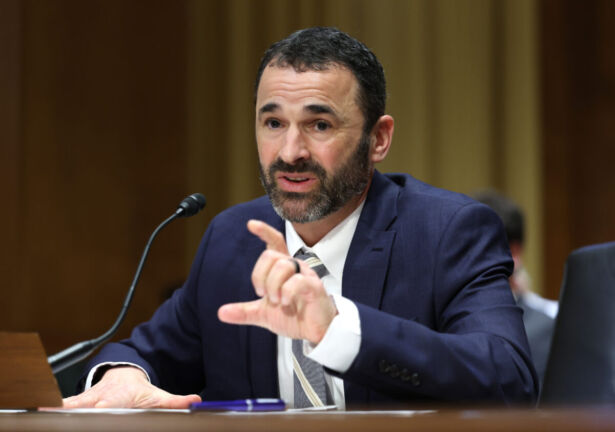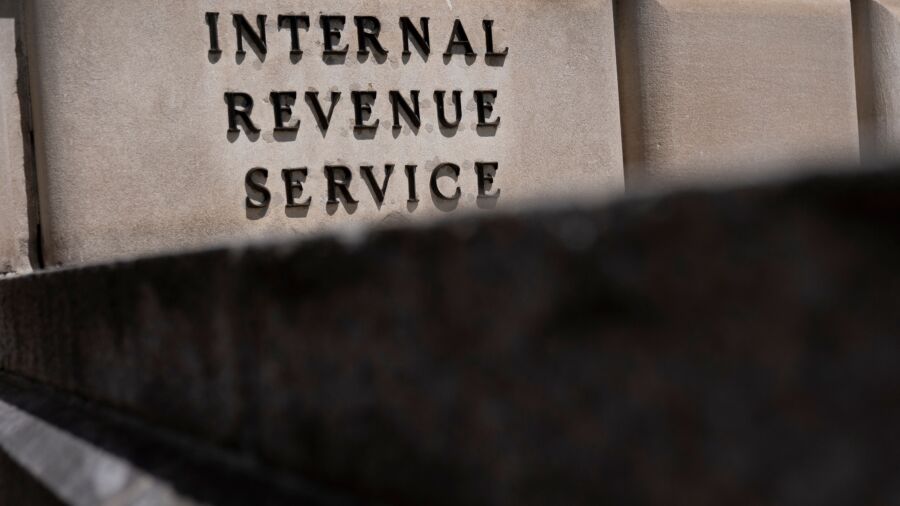The Internal Revenue Service (IRS) is hiring armed tax agents nationwide to bolster the ranks of its criminal investigations division as the Biden administration seeks to beef up enforcement of tax laws with $80 billion in new funding.
IRS Commissioner Danny Werfel confirmed during a Thursday hearing of the House Ways and Means Committee that the IRS Criminal Investigations (IRS-CI) unit plans to hire additional staff who are authorized to carry guns.
Werfel was responding to a question from Rep. Adrian Smith (R-Neb.) about whether an estimated 360 new armed agents would be hired per year over the next five years for a net gain of 1,200 after attrition due to resignation and retirement.
The IRS replied that Smith’s estimate sounds “about right,” though he added that they would not be used to increase the number of tax audits.
“Our CI division or Criminal Investigation Division, they do not conduct audits,” Werfel said. “What they do is, they are investigating acute issues of fraud and tax evasion. And typically, they’re armed when they’re putting themselves in danger.”
The IRS-CI examines potential criminal activity related to tax crimes and makes recommendations for prosecution to the tax division of the Department of Justice (DOJ).

‘Gun-Toters’
Dubbed “gun-toters,” the armed special agents in the IRS-CI unit are responsible for enforcing those parts of the tax code whose violations amount to crimes, former IRS Special Agent Robert Nordlander told Accounting Today in a wide-ranging interview in February.
“When crimes are committed, the IRS-CI are the ones that actually enforce” the law, Nordlander said.
There are now around 2,100 agents in the criminal investigations division, Carissa Cutrell, a public affairs officer at IRS-CI, told The Epoch Times in an emailed statement.
“As the only agency with the authority to investigate tax crimes, and the only agency that spends 100 percent of its time investigating financial crimes, IRS Criminal Investigation (IRS-CI) ensures its limited resources are allocated to the most egregious financial crime cases,” she explained.
“IRS-CI’s mission includes not only investigating criminals for crimes they’ve committed but also deterring potential criminals from committing future crimes,” Cutrell added.
In the mid-1990s, the unit had around 3,500 special agents, and Cutrell said they lose between 150 and 175 agents each year due to retirement and attrition.
She said the unit plans to hire around 350 agents this fiscal year for a net gain of between 150 and 175, numbers that are roughly in line with the estimate Werfel confirmed during the hearing.
According to a job posting on USAJOBS.gov, IRS-CI is looking to fill 360 vacancies for new full-time criminal investigation special agents spread across all 50 states.
A job posting on the IRS Careers website for criminal investigation special agents says they will be authorized to carry a firearm and must be “willing and able to participate in arrests, execution of search warrants, and other dangerous assignments.”
“As a Special Agent you will combine your accounting skills with law enforcement skills to investigate financial crimes. Special Agents are duly sworn law enforcement officers trained to ‘follow the money,’” the posting reads.
Salaries range from $52,921 to $94,228 per year, though IRS-CI special agent positions are unique in that they offer special pay incentives not offered with other IRS positions.
Criminal investigations special agents are eligible for a Law Enforcement Availability Pay (LEAP) adjustment, which gives a 25 percent increase over the standard Office of Personnel Management (OPM) pay scale.
“This is a special added benefit for federal law enforcement professionals and considers the fact that you may be working long and irregular hours and may be called upon to respond on a moment’s notice as needed,” IRS-CI said in a note explaining that such agents are expected to work an average of 50 hours per week.
Some have questioned why IRS agents would need to carry firearms at all. Former Fox News host Tucker Carlson, for example, on Aug. 4, 2022, led a segment on his show by expressing concern that the government is “treating the IRS as a military agency” and is “stockpiling” ammunition.
The IRS-CI says agents might need to respond to “life-threatening situations” on the job, be willing and able to participate in “dangerous assignments” and protect themselves and others from physical attacks, and be willing to use “deadly force.”
IRS Hiring Plans
A strategic operating plan released on April 6 indicates how the IRS plans to use the $80 billion in new funding provided by the Democrats’ Inflation Reduction Act.
The plan shows the new cash infusion will be used to hire thousands of new employees, improve tax enforcement and customer service, and audit wealthy taxpayers and corporations.
The IRS employed 80,006 full-time staffers as of the 2022 budget year, per the plan.
The agency intends to hire nearly 20,000 new full-time employees during the 2023 and 2024 fiscal years, including 8,782 hires in enforcement and 13,883 in taxpayer service.
Assuming no attrition owing to resignation and retirement, that would put the IRS’s total workforce by 2024 at roughly 100,000 employees.
Republicans have warned that the IRS’s $80 billion cash infusion would be used to hire an “army of 87,000” tax enforcers.
The 87,000 figure comes from a 2021 Treasury Department report (pdf) that estimated that the IRS could hire 86,852 full-time employees over a decade if it received an $80 billion funding boost.
From The Epoch Times

